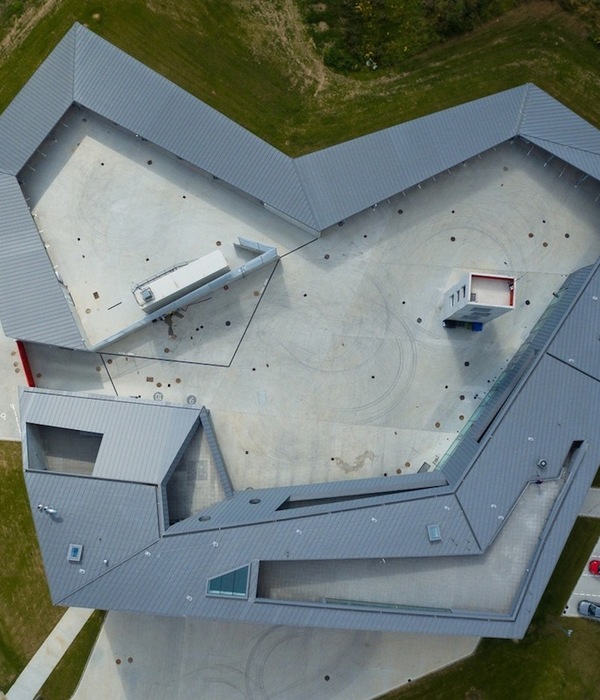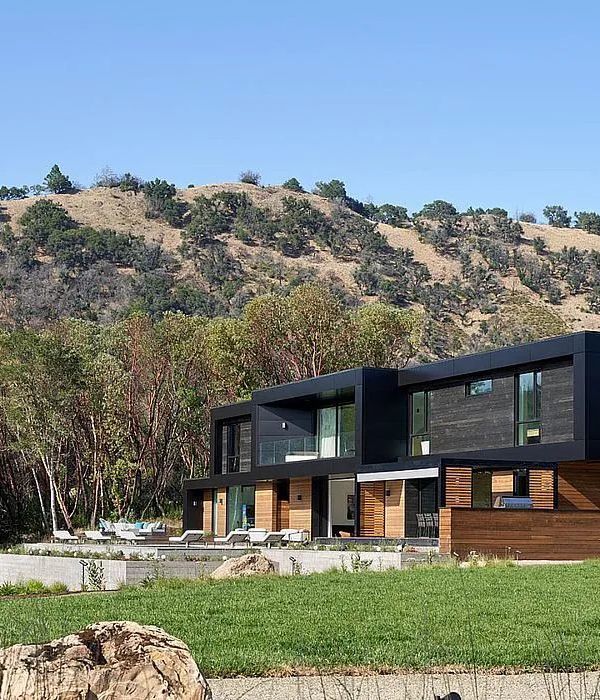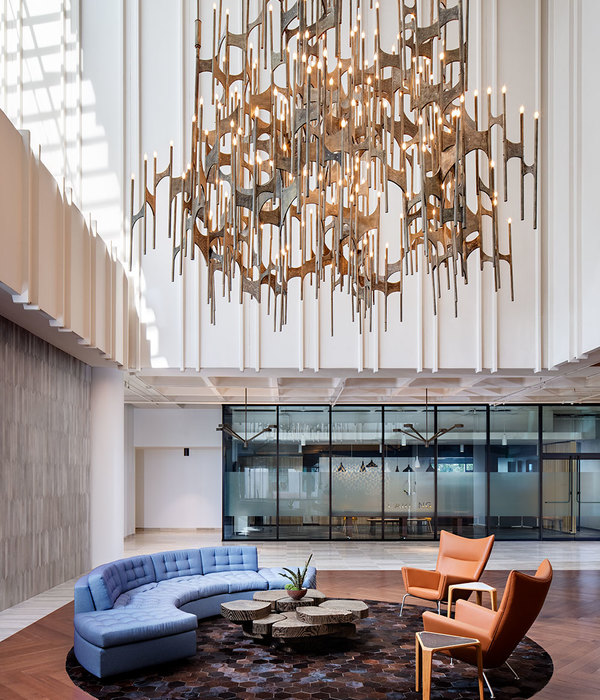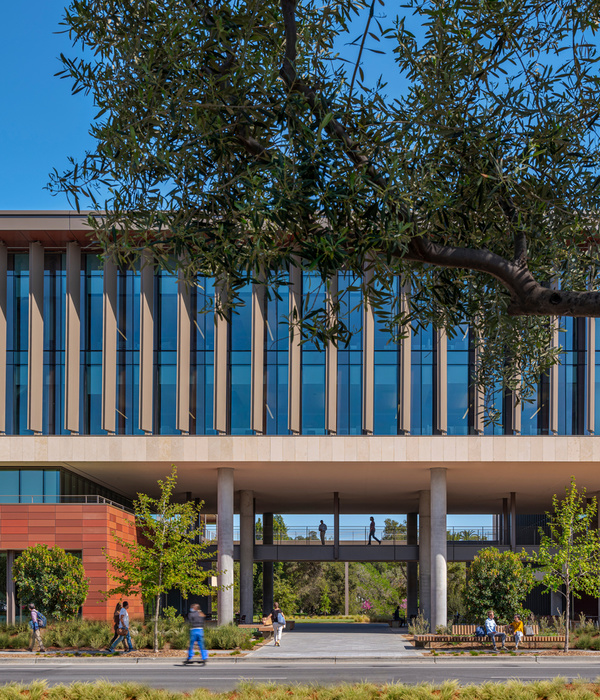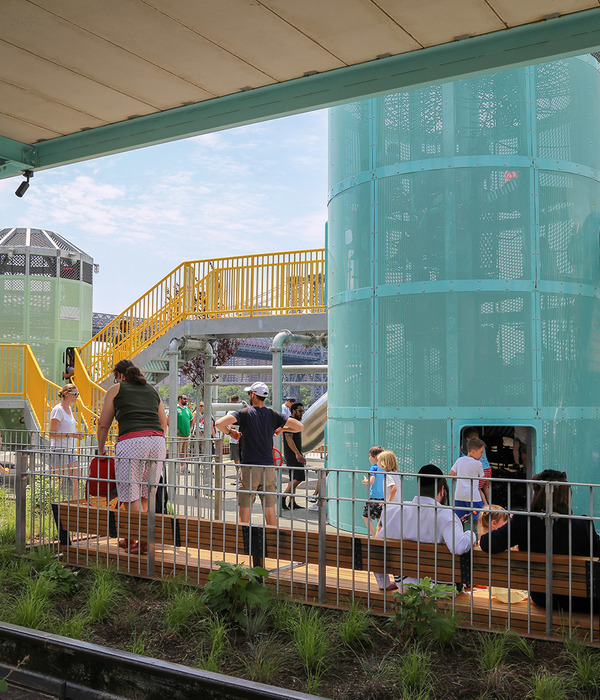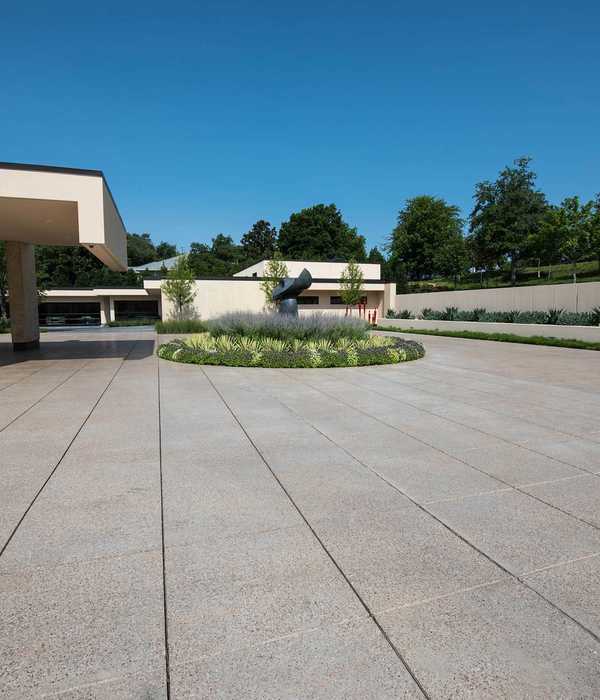“希望之城”是癌症,糖尿病及其他致命性疾病的研究及治疗中心。这一坐落在加州的项目为该中心成立的百年纪念性建筑。该7000平方英尺新建项目容纳了包括讲演、展览和办公功能等多种功能。项目获得LEED铂金级认证。
The City of Hope, a leading research and treatment center for cancer, diabetes and other life-threatening diseases, marked its centennial with the addition of a new, multi-faceted space at the heart of its Duarte, California campus. In addition to creating 7,000sqft for lectures, exhibits, events, and administrative offices, the LEED Platinum Centennial Pavilion engages the landscape to form an outdoor sanctuary.
▼建筑外貌,exterior view
受场地右侧许愿树的启发,该设计将场地中偏离轴线的步行道路重新对齐,并将建筑围绕场地现有樟树而建。新建部分加强了该研究中心建筑与场地的关系。该场馆包含两个围绕樟树向外辐射的单层建筑。两个弧形的混凝土墙壁将出入口保护在内,并围绕樟树形成一个安静的休息区。这一设计使得休憩于此的人与出入建筑的人互不打扰。LED灯沿曲面墙壁依次排开,如同里程碑一般,向人们展示着该研究机构的辉煌历史,也播下了明日之种。
Inspired by wishing trees found across campus (right), our design re-aligns an off-axis promenade on the campus grid and wraps the Pavilion around an existing camphor tree that was planted around the same time the City of Hope was founded. The location of the project draws a strong connection between the institution’s heritage and its site. The Pavilion comprises two single-story buildings that radiate from the camphor. Two curved concrete walls protect the interior entrances while twisting to create a contemplative seating area around the tree; their alignment is such that people entering and exiting the buildings are kept out of sight to those enjoying this outdoor zone. Along the surface of both walls, LED-lit niches highlight the City of Hope’s many milestones, while leaving room for future accomplishments to be noted.
▼场地规划,site plan
▼两弧面墙环绕樟树而设,curved concrete walls surround the tree
▼弧面墙壁形成休息区,the curved wall created a seating area
▼LED灯沿曲面墙壁排开如同建筑的里程碑,LED-lit niches highlight the City of Hope’s many milestones
建筑的南向开窗在避免了阳光直射的同时,也拉近了室内外的环境关系。耐旱种植植被和透水铺装,以及低流量节水装置帮助建筑实现节约性能。全新的建筑与户外环境一起,为来访者和研究机构的工作人员提供了舒适悠闲的空间。
The buildings’ openness to the north avoids excessive heat gain and exposure, and draws a strong connection between the occupants and the surrounding landscape. Drought-tolerant planting and pervious pavers, along with low-flow fixtures help the project achieve significant water usage savings. The creation of this new Pavilion and outdoor area continues to draw both staff and visitors alike, providing a welcome counterpart to a typical uncongenial healthcare environment.
▼建立室内外的联系,a strong connection between the occupants and the surrounding landscape
▼建筑内部,interior view
▼可持续性设计,sustainable strategy
▼平面图,plan
▼剖面图,section
Client: City of Hope Location: Duarte, California Completion Date: 2015 Area: 7,000sqft LEED Certification: Platinum Project Team: Belzberg Architects, Hagy Belzberg (Partner-in-Charge), Daniel Rentsch, Andrew Kim, Ashley Coon, David Cheung, Cory Taylor, Susan Nwankpa, Micah Belzberg, Chris Sanford, Kristofer Leese, Chris Arntzen(Project Manager) Landscape Architect: Ahbe Landscape Architects Structural Engineer: Nous Engineering MEP Engineer: California Energy Designs Civil Engineer: VCA Engineers General Contractor: Winters-Schram & Associates LEED Consultant: Green Dinosaur Photography: Bruce Damonte + Benny Chan/Fotoworks
{{item.text_origin}}



